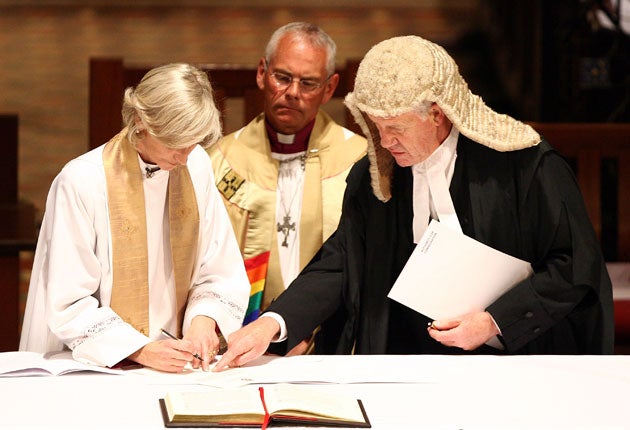Opt-out for parishioners opposed to women bishops
Church of England proposes compromise to avoid acrimonious split

Your support helps us to tell the story
From reproductive rights to climate change to Big Tech, The Independent is on the ground when the story is developing. Whether it's investigating the financials of Elon Musk's pro-Trump PAC or producing our latest documentary, 'The A Word', which shines a light on the American women fighting for reproductive rights, we know how important it is to parse out the facts from the messaging.
At such a critical moment in US history, we need reporters on the ground. Your donation allows us to keep sending journalists to speak to both sides of the story.
The Independent is trusted by Americans across the entire political spectrum. And unlike many other quality news outlets, we choose not to lock Americans out of our reporting and analysis with paywalls. We believe quality journalism should be available to everyone, paid for by those who can afford it.
Your support makes all the difference.The Church of England last night tried to avoid a split by watering down its plans for the consecration of women bishops, granting an opt-out to parishioners who refuse to accept the spiritual authority of female clergy.
Under the church's proposals, parishes could bypass women bishops and women priests by taking their leadership from specially consecrated male "complementary" bishops.
Parents could elect to have their children confirmed and baptised by male clergy while congregations could seek to have sacraments and other divine service removed from the responsibility of a female bishop.
The ungainly get-out clause, drawn up in response to the Synod's historic vote in July in favour of consecrating women bishops, is set to provoke dee-per divisions within the church.
The outcome of the July vote raised the real possibility of schism within the church, between those in favour of women bishops and an alliance of traditionalists, Anglo-Catholics and evangelicals who oppose the idea.
A drafting committee member resigned and hundreds of traditionalist clergy threatened to leave the Anglican Communion if the church went ahead with the consecration of women bishops without providing legal safeguards to protect their beliefs.
The revised plans – published yesterday by a committee chaired by the Bishop of Manchester, the Right Rev Nigel McCulloch – accommodate traditionalists at the cost of provoking the church's more liberal wing. The Synod will consider the plans in February.
The report stated: "We know that there are those who believe that anything short of structural provision for those unable in conscience to accept the ordained ministry of women as priests and bishops will be insufficient.
"We are also well aware that, from another point of view, the introduction of any arrangements, structural or otherwise, which mean that women may not be able to minister as bishops or priests within certain parishes, will be seen as unacceptable because it perpetuates a difference of treatment on grounds of gender.
"There is, therefore, a need for an approach which attempts to square this difficult circle. It is not, in fact, unique to have a situation in law where there is not complete equality of opportunity for both sexes. The exercise of women's priestly and episcopal ministry in certain places can properly be restricted by law, but this should only be to an extent that is 'proportionate' in order to respect the theological convictions of others."
The Bishop of Manchester's report also places a requirement on theological opponents to female bishops to accept that their ordination in the Church of England is legally binding.
The authority exercised by a "complementary bishop" would be conferred by the diocesan bishop who may be a woman. This could lead to further objections on the grounds that the ultimate source of the priest's authority derives from a woman. Critics said the proposal was a fudge.
Dr McCulloch said the committee finished its discussions just before Christmas and the report had been published quickly to allow for debate. "The General Synod mandated us to draft a measure including special arrangements, within existing structures, for those unable to receive the ministry of women bishops and to do that in a national code of practice. We believe we have achieved that. "
Join our commenting forum
Join thought-provoking conversations, follow other Independent readers and see their replies
Comments